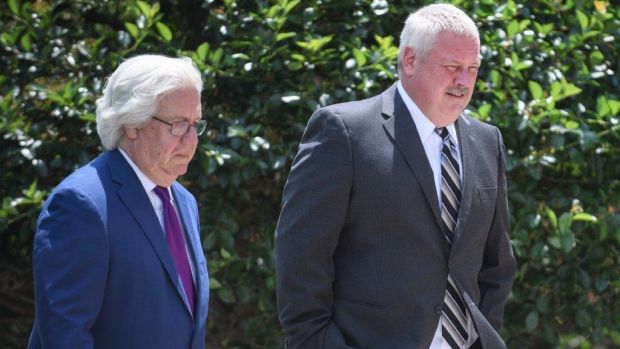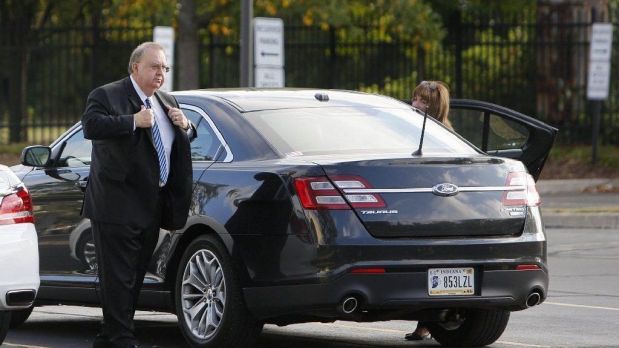The impact of the U.S. Supreme Court overturning former Portage Mayor James Snyder’s conviction on a felony bribery charge last week likely won’t impact other cases where officials have already been charged under the same statute, according to an Indiana University Maurer School of Law professor.
But Steve Sanders, a law professor who has studied Supreme Court decisions over the last 11 years, said the ruling could impact how local officials interact with vendors or contractors.
“At least as a matter of federal law, it arguably makes it easier for a local official to approach someone after the fact and ask for a gratuity, as long as there wasn’t an agreement in advance that would allow it to be characterized as a bribe,” Sanders said.
With a 6-3 vote, the Supreme Court ruled in its decision that the $13,000 payment Snyder received after providing the owners of Great Lakes Peterbilt with a $1 million contract for new garbage trucks was a gratuity, not a bribe.
The 18-page opinion, written by Justice Brett Kavanaugh, ruled that the bribery statute commonly known as 666, which is its number in the federal criminal code, applies only to quid pro quo agreements and does not include “gratuities,” meaning rewards given to elected officials after the fact.
“They are essentially saying he was prosecuted under a faulty theory for the use of this particular statute,” Sanders said. “This is simply the Supreme Court saying federal prosecutors attempted to use a law that does not cover this situation.”
The court found that there are two federal statutes: one applying to bribery and one applying to gratuity, Sanders said. As a federal employee, the maximum penalty for bribery is 15 years in prison and the maximum penalty for gratuity is 2 years in prison.
On the other hand, the court found that there is only one statute for state and local officials that addresses bribery, Sanders said.
The court looked at the statute for state and local officials and ruled that it “airs a very close resemblance” to the federal bribery statute, Sanders said. The court then concluded that if Congress “intended to criminalize the receipt of gratuities” at the local level it “would have made that clear or there would have been a second statute,” he said.
“It’s an example where when Congress seems to be unable to act we rely on the Supreme Court to try to interpret what Congress intended,” Sanders said. “The court said here, ‘For state and local officials, we don’t believe that Congress intended this statute to be used for anything other than bribery, not gratuities.’”
A statutory interpretation “is always a judgment call,” Sanders said. The court typically interprets a statute by taking into account “the pure text” or by comparing the statute to other statutes, he said.
“It’s unfortunate that the case was divided along ideological lines,” Sanders said. “This felt like a situation where a conservative majority was not using the approach to statutory interpretation that it typically prefers, but I don’t know what explanation that there could be for that.”
The only way to undo the ruling would be for Congress to pass a law that addresses gratuities for state and local officials, Sanders said. If that were to happen, Sanders said, it wouldn’t apply to Snyder’s case.
“But, for the future, if we think that state and local officials should be criminally prosecuted if they accept gratuities as opposed to bribes, then Congress could easily pass a law to that effect,” Sanders said.
In Snyder’s case, Sanders said while the ruling will overturn his bribery charge, he could be punished for accepting a gratuity under a state or local law. But Sanders said he wasn’t aware of a state or local law that would apply in Snyder’s case.
“This is simply about what federal prosecutors can do. It doesn’t say that gratuities are acceptable behavior. It just says if you’re going to prosecute somebody for a gratuity there has to be a proper law in place and there wasn’t here,” Sanders said.
Former Lake County Sheriff John Buncich arrives at the federal court in Hammond for the 10th day of his public corruption trial in 2017. (Suzanne Tennant/for Post-Tribune)
In Lake County, former Lake County Sheriff John Buncich, 78, was charged with bribery under the 666 statute, among other charges, for soliciting bribes from county tow operators. He was sentenced to 15 years and 8 months in federal prison in January 2018 and resentenced to 151 months on Aug. 5, 2020.
On Nov. 14, 2023, attorneys filed a petition for a sentence reduction of 30 months after the U.S. Sentencing Commission made changes to guidelines that recognized certain offenders – those with no prior criminal history – should be treated more leniently in sentencing.
Buncich’s attorneys Kerry Connor and Geoffrey Giorgi did not respond to multiple requests for comment.
Sanders said the ruling doesn’t undo cases where the facts of a case point to bribery because the statute still stands and prosecutors can charge people for bribery. But cases where a charge of bribery was given but the facts point to a gratuity could be reexamined, he said.
“If someone has already been convicted under the statute but it was clear that the government characterized what they did as accepting a gratuity, rather than a bribe, then that person would be entitled to be released from jail. They are being held in jail under a law that’s not valid,” Sanders said.
Assistant U.S. Attorney Joseph Fitzpatrick declined to comment on the court’s ruling.
Attorney and former Gary Mayor Scott King, who represented former East Chicago Mayor George Pabey when he was convicted in 2010 of conspiracy and theft of government funds, recalled how he got his first summer job. He grew up in Chicago and received a letter from his ward’s alderman to report to Soldier Field to sign up for summer employment.
As he was standing in line, a man asked King if he had his letter from the alderman; when he said he did, the man laughed and took him to the front of the line, where he interrupted another person’s interview to give King his. While not having anything to do with bribery, the man’s actions cast a pall on the way King believed the system worked, he said, the same way he expects the SCOTUS verdict to cast a pall.
“It’s going to have a presumptive effect on people’s view of government,” King said. “I was mayor for 10 years, and I never got tips, so it struck me as odd. Receiving a ‘gratuity’ for doing your job? That’s not good.”
“Suppose, for example, a mayor and the Board of Works award contracts to Contractors A and B, and upon the completion of the contract, Contractor A hands the mayor a ‘gratuity’ but Contractor B doesn’t. What happens when they go to renew their contracts? What’s that impact?” King said.
King expects the Snyder verdict will significantly reduce the number of bribery cases coming before the court. But he believes the ruling creates more problems than it solves, and it’ll be up to the state to mitigate those issues.

Ex-Merrillville Councilman Tom Goralczyk arrives to his sentencing at the U.S. Federal Courthouse in Hammond with attorney Scott King on Tuesday, June 5, 2018. (Kyle Telechan/for Post-Tribune)
“It’ll be interesting to see if our state legislators fill in any of the gaps in what public officials can and cannot accept. But really, what are we trying to fix?” he said.
As for what this means for Pabey, King said there are “a number of aspects that need to be carefully examined” before he would advise Pabey on anything, such as whether the ruling allows for retroactive application.
Retired attorney Cal Bellamy, the founder and President Emeritus of the Shared Ethics Advisory Commission, said that by and large, the communities and politicians who run them “overwhelmingly” want to do the right thing. It’ll be up to them, however, to define what their rules are.
“Once they know the rules and definitions, and we train them to adhere to them, we think that’ll improve ethical behavior,” Bellamy said. “The ruling doesn’t make sense to me, but those are decisions beyond our control. It just means we will continue to train people just like ministers do every Sunday and teachers do every day.”
akukulka@post-trib.com
Michelle L. Quinn is a freelance reporter for the Post-Tribune.



